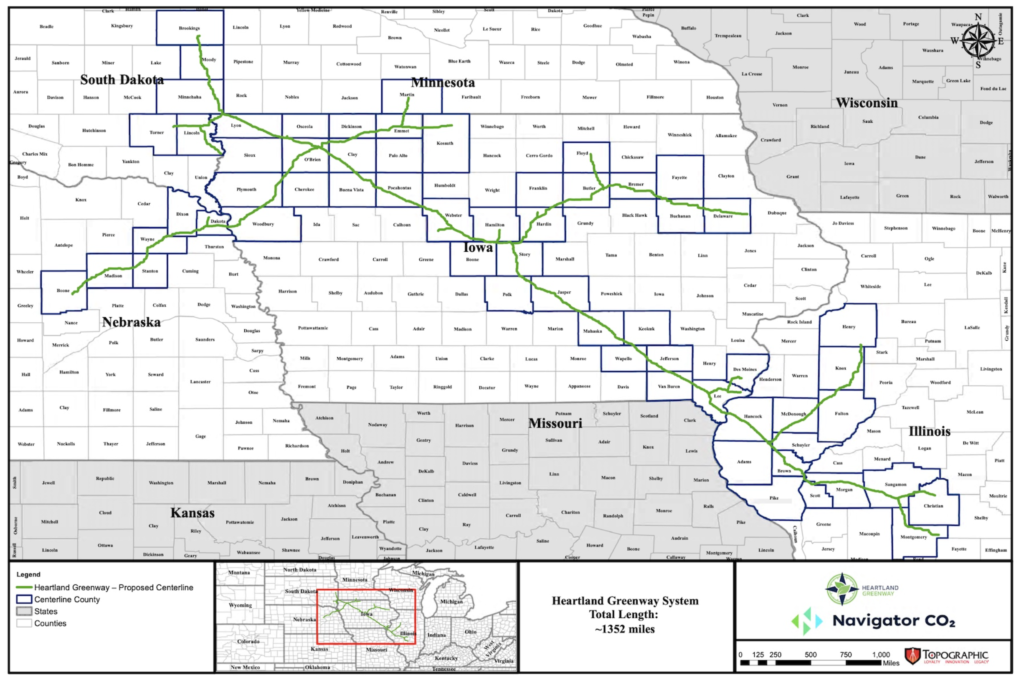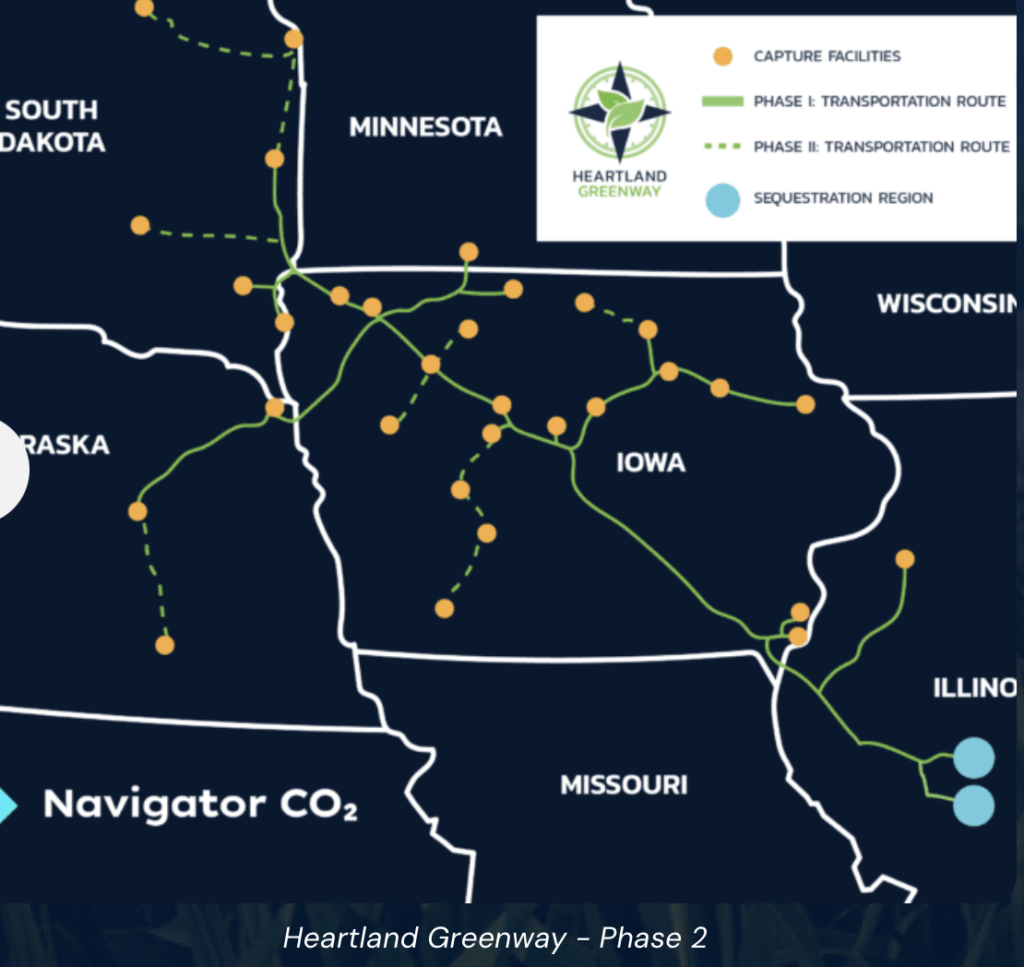In a remarkable turn of events, South Dakota state officials said no to big business.
Yesterday, the Public Utilities Commission unanimously rejected Navigator CO2‘s application to build its Heartland Greenway pipeline to ship waste carbon dioxide from South Dakota ethanol plants, including heavy hitters Poet in Chancellor and Valero in Aurora, to a sequestration site in Illinois. Commissioner Kristie Fiegen said Navigator didn’t play ball well with the PUC or landowners:
Fiegen said she was concerned Navigator’s lack of prompt response and objections to several staff questions and discovery attempts would raise issues with the company’s willingness and ability to comply with applicable laws and rules in the future.
“They were not prompt, and they even struggled with administrative tasks of notifying landowners to routes and public input meetings,” Fiegen said. “Two hundred and four landowners were not notified of the public input [meetings], and 92 of those landowners were not notified to the route” [Dominik Dausch, “South Dakota Regulators Deny Navigator’s CO2 Pipeline Application,” Sioux Falls Argus Leader, 2023.09.06].
Commissioner Chris Nelson said opposition from landowners, albethey somewhat misinformed, swung him toward rejection:
“I would note, not a single South Dakota farmer testified in favor of this project,” Nelson said.
Yet Nelson also said some of the public’s concerns about the safety of the project are misinformed and exaggerated [Joshua Haiar, “South Dakota Regulators Deny Permit for Navigator CO2 Carbon Pipeline,” South Dakota Searchlight, 2023.09.06]..
Commissioner Nelson said he would support the motion to deny but, for him, the question was closer than it was for Fiegen or Hanson. Nelson said Navigator hadn’t addressed the welfare of the inhabitants along the proposed route, which is one of the requirements in state permitting law. He cited the high percentages of landowners who refused Navigator’s offers to allow the line.
“While that’s certainly not one hundred percent of the landowners, to me it is a stunningly large percentage of landowners, many of them inhabitants who simply said, No. And so my conclusion is that this project would substantially impair the welfare of the inhabitants,” Nelson said [Bob Mercer, “South Dakota Public Utilities Commission Nixes Navigator,” KELO-TV, 2023.09.06].
Commissioner Gary Hanson said carbon dioxide pipelines must meet a higher standard than the fuel pipelines that the PUC regulates because CO2 pipelines are not utilities directly serving the public:
Hanson said all pipelines aren’t the same. “Unlike the natural gas and propane pipeline companies, Navigator is not a utility and is not distributing a product to consumers. The pipeline therefore does not need to be in the proximity of humans or livestock or economic growth areas of communities or farmsteads. The location of the natural gas lines in municipal areas were shown by Navigator to argue that hazardous pipelines can be in thriving communities. However, natural gas and propane and water provide fuel for homes, businesses and industry and to create electricity. CO2 pipelines do not,” Hanson said [Mercer, 2023.09.06].
That distinction of carbon dioxide pipelines from energy utilities also factored into the PUC’s rejection of a related motion filed by Navigator to preëmpt local ordinances, from stricter setbacks to outright pipeline moratoria, that might hinder their project:
On the issue of preemption, Nelson moved to deny Navigator’s motion.
Nelson pointed to South Dakota Codified Law 49-41B-1, which describes permit authority energy conversion and transmission facilities. He said the law was implemented to apply to energy-generating facilities, of which Navigator is not.
“After 12 days of hearings, there is not one single sentence of testimony … that talk about the energy requirements of this state,” Nelson said. “This pipeline doesn’t have anything to do with creating energy for South Dakotans” [Dausch, 2023.09.06].


South Dakota would have seen three ethanol plants hook on to a couple tails constituting 112 miles of the 1,352-mile Phase 1 system connecting 18 other CO2 emitters in Nebraska, Minnesota, Iowa, and Illinois. Navigator envisions a Phase 2—not part of yesterday’s rejected application—expansion that would add three more plants in South Dakota, one more in Nebraska, and six more in Iowa. Navigator has not yet said whether it will attempt to build the rest of the project without South Dakota or whether it will reapply to the PUC.
The PUC’s rejection of Navigator’s project will weigh heavily over the corporate and political poobahs of Summit Carbon Solutions, whose CO2 pipeline application receives its hearing before the PUC starting next week on Monday, September 11. Summit makes many of the same economic arguments for its project. Navigator has been more open and less disrespectful of landowners than Summit Carbon Solutions. If Navigator can’t clear the PUC’s bar, Summit may see its application crash and fall even harder.
Hanson is 100% correct: CO2 pipelines don’t deliver anything useful to the public, so they are not a utility,.
Ya certainly don’t eminent domain for something like this.
I’m going to venture a bit here and suggest that the PUC might be a bit more accommodating to Summit Carbon Solutions because SCS has made more inroads with establishment (fiscal first) Republicans in South Dakota. It appears to me that SCS has said more of the right things and more importantly made the right promises to the targeted influencers.
🍿🍿🍿
Watching the SDGOP fracture over whether saving the planet is a worthwhile goal is simultaneously vertiginous and side-splitting.
Speaking of pathetic losers it looks like pernicious pug Pat Powers has contracted the Trump virus!